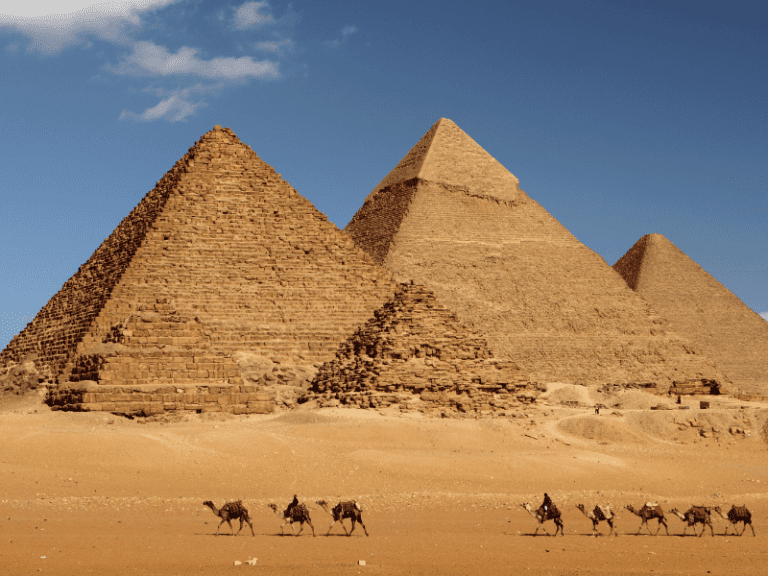Ancient Egyptian civilization is renowned for its remarkable achievements in areas like architecture, engineering, and culture. But one of the less-discussed yet equally vital aspects of Egypt’s success was its extensive trade networks. These networks not only allowed Egypt to acquire valuable resources but also helped it become a dominant power in the ancient world. Understanding how Ancient Egypt’s trade systems worked—and their far-reaching impact—provides insight into the interconnected nature of ancient civilizations. For travelers today, exploring Egypt’s trade history can add another layer of appreciation when visiting key historical sites.
The Heart of Egypt’s Trade: The Nile River
The Nile River was not only the lifeblood of Egypt’s agriculture but also its primary trade route. The river facilitated the movement of goods from the southern regions of Egypt to the northern Delta, where they could be shipped off to other civilizations. The river’s predictable flow and the ease with which boats could travel on it allowed Egypt to establish trade links both internally and with neighboring countries.
- Internal Trade: Goods such as grain, papyrus, linen, and pottery were transported from the agricultural heartlands to the bustling markets in cities like Thebes and Memphis.
- Export Goods: Egypt exported luxury items such as jewelry, cosmetics, and textiles, which were highly prized by neighboring civilizations.
- Connecting Cultures: The Nile served as a connector between Egypt and various African kingdoms, facilitating both commerce and cultural exchange.
This river-based trade network enabled Egypt to thrive by allowing the easy transportation of goods and fostering relations with neighboring regions.
Egypt’s Trade Partners: Who Were They?
Ancient Egypt engaged in extensive trade with a variety of neighboring civilizations. Through trade routes stretching from sub-Saharan Africa to the Mediterranean, Egypt acquired essential raw materials and luxury goods that it lacked locally. Egypt’s primary trade partners included:
- Nubia: Located to the south of Egypt, Nubia was a key source of gold, ebony, ivory, and exotic animals, which were highly prized in Egyptian society.
- Mesopotamia: In exchange for luxury goods, Egypt traded for precious metals, such as silver and tin, as well as textiles and other products.
- Canaan and Syria: These regions provided Egypt with timber, olive oil, wine, and other goods that were scarce in Egypt’s arid climate.
- Punt: Known as the “Land of the Gods,” Punt was an exotic and mysterious region located to the southeast of Egypt, known for offering incense, myrrh, frankincense, and other aromatic substances used in religious rituals.
These interactions formed the backbone of Egypt’s trade economy and significantly influenced its art, culture, and religion.
The Role of Egyptian Trade in Building an Empire
Trade was a central part of Egypt’s imperial strategy. Pharaohs understood that in order to expand and maintain Egypt’s power, they needed to control key trade routes and secure valuable resources. Egypt’s strategic location at the crossroads of Africa and the Middle East gave it access to a wide range of trade opportunities, which played a key role in maintaining its political and economic strength.
- Military Expeditions for Trade: Pharaohs would often lead military expeditions into neighboring regions to secure trade routes or resources, such as the famous military campaign of Pharaoh Thutmose III to Syria and Palestine.
- Control of Trade Routes: By controlling vital trade routes, Egypt could dominate the exchange of goods between Africa, Asia, and Europe, ensuring its economic supremacy.
- Cultural Influence: As Egypt expanded its trade empire, it also spread its art, religion, and technology to other regions, leaving a lasting influence on neighboring cultures.
The Egyptian Empire’s wealth and influence were built in large part on its successful trade networks, which allowed it to maintain political power while enriching its civilization.
Trade Goods: The Wealth of Egypt’s Economy
Egypt’s economy was largely based on agriculture, but its trade networks played a crucial role in providing luxury goods and resources that were necessary for the kingdom’s prosperity. Some of the most valuable trade goods included:
- Gold and Precious Stones: Egypt had access to abundant gold reserves, especially in Nubia, and traded it for other valuable goods like silver, lapis lazuli, and semi-precious stones.
- Incense and Myrrh: These aromatic resins were used in religious ceremonies and as perfumes, and were highly sought after by both Egyptians and foreign civilizations.
- Timber and Building Materials: Due to Egypt’s limited forests, timber was a precious commodity, and trade routes were established to acquire wood for construction.
- Exotic Animals: Lions, leopards, and other exotic animals were highly prized, often brought back from expeditions to places like Nubia and Punt.
These goods not only made Egypt a wealthy nation but also allowed it to maintain cultural and religious practices that set it apart from other civilizations.
The Influence of Egyptian Trade on Other Civilizations
The influence of Egypt’s trade networks was not limited to its borders. As Egypt interacted with neighboring cultures, it introduced them to new products, technologies, and ideas. Egypt’s advanced knowledge of mathematics, astronomy, and medicine made it a key influence on neighboring civilizations, especially those in the Mediterranean.
- Art and Architecture: Egypt’s architectural styles, especially the use of columns, influenced Greek and Roman building designs.
- Religious Influence: Egyptian gods and religious practices had a profound impact on Mediterranean and African religions.
- Trade Innovations: Egypt was a pioneer in developing trade practices, including the use of the first known currency system for exchanging goods.
This cultural diffusion through trade helped create the interconnected world of the ancient Mediterranean and Near East, where goods, ideas, and technologies flowed freely between civilizations.
Conclusion: Ancient Egypt’s Legacy in Global Trade
Ancient Egyptian trade networks were integral to the civilization’s success, enabling it to thrive economically, politically, and culturally. From the Nile River to the far reaches of Africa and Asia, Egypt’s trade routes connected it to the rest of the ancient world, ensuring its place as one of the most powerful and influential civilizations in history. Today, as Egypt continues to be a major tourist destination, understanding the impact of these ancient trade networks provides travelers with a deeper appreciation of the country’s rich history. If you’re planning a visit, Travel Joy Egypt offers curated tour packages that explore the many layers of Egypt’s past, from its monumental achievements to the far-reaching influence of its trade networks.












